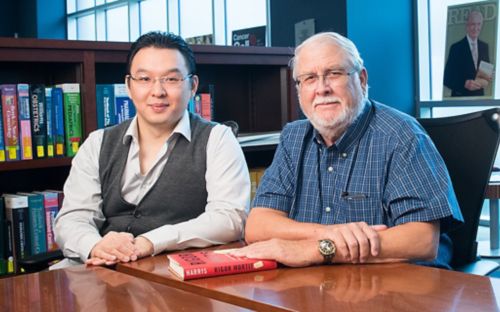St. Jude Family of Websites
Explore our cutting edge research, world-class patient care, career opportunities and more.
St. Jude Children's Research Hospital Home

- Fundraising
St. Jude Family of Websites
Explore our cutting edge research, world-class patient care, career opportunities and more.
St. Jude Children's Research Hospital Home

- Fundraising
A hypothesis can’t be right unless it can be proven wrong

Charles Rock, PhD, (right) and Jiangwei Yao, PhD, recently reviewed Richard Harris’ book about scientific research, titled "Rigor Mortis: How Sloppy Science Creates Worthless Cures, Crushes Hope, and Wastes Billions." Now, Rock and Yao address specific issues raised in Harris’ book and offer solutions or tips to help avoid the pitfalls identified in the book.
“That (your hypothesis) is not only not right; it is not even wrong.”
A hypothesis is the cornerstone of the scientific method.
It is an educated guess about how the world works that integrates knowledge with observation.
Everyone appreciates that a hypothesis must be testable to have any value, but there is a much stronger requirement that a hypothesis must meet.
A hypothesis is considered scientific only if there is the possibility to disprove the hypothesis.
The proof lies in being able to disprove
A hypothesis or model is called falsifiable if it is possible to conceive of an experimental observation that disproves the idea in question. That is, one of the possible outcomes of the designed experiment must be an answer, that if obtained, would disprove the hypothesis.
Our daily horoscopes are good examples of something that isn’t falsifiable. A scientist cannot disprove that a Piscean may get a surprise phone call from someone he or she hasn’t heard from in a long time. The statement is intentionally vague. Even if our Piscean didn’t get a phone call, the prediction cannot be false because he or she may get a phone call. They may not.
A good scientific hypothesis is the opposite of this. If there is no experimental test to disprove the hypothesis, then it lies outside the realm of science.
Scientists all too often generate hypotheses that cannot be tested by experiments whose results have the potential to show that the idea is false.
Three types of experiments proposed by scientists
- Type 1 experiments are the most powerful. Type 1 experimental outcomes include a possible negative outcome that would falsify, or refute, the working hypothesis. It is one or the other.
- Type 2 experiments are very common, but lack punch. A positive result in a type 2 experiment is consistent with the working hypothesis, but the negative or null result does not address the validity of the hypothesis because there are many explanations for the negative result. These call for extrapolation and semantics.
- Type 3 experiments are those experiments whose results may be consistent with the hypothesis, but are useless because regardless of the outcome, the findings are also consistent with other models. In other words, every result isn’t informative.
Formulate hypotheses in such a way that you can prove or disprove them by direct experiment.
Science advances by conducting the experiments that could potentially disprove our hypotheses.
Increase the efficiency and impact of your science by testing clear hypotheses with well-designed experiments.
For more on the challenges in experimental science, read our review of Richard Harris’ Rigor Mortis: How Sloppy Science Creates Worthless Cures, Crushes Hope, and Wastes Billions.
A researcher’s look at Rigor Mortis: Are motivators and incentives to find a cure hurting scientific research?
St. Jude researchers take a look at Rigor Mortis, Richard Harris’ exposé of how the drive to find results hampers scientific progress.








